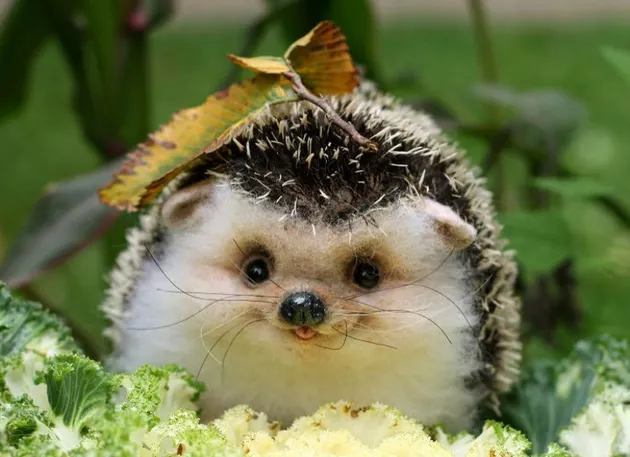They don’t have a brain really and kinda just float there. Do they even feel pain?
deleted by creator
They’re animals, so no.
I believe that it is not, since scientifically it is an animal. However, some vegetarians (not vegans) will eat fish or certain animal products.
I thought that people who would eat fish but not other animals were pescatarians.
Yes, but fewer people know that word, so it’s less useful. And if you want to have a word to describe every specific version of “meat is bad” diets, you’d need as many words as there are people who avoid meat.
We use the word vegetarian to mean that we don’t eat animals. Fish is an animal.<br> we, vegetarians, don’t eat fish and “vegetarian” is a useful word to mean exactly that.<br> we don’t stop using precise words just because “fewer people know that word”! What kind of a reasoning is this 🤦
Words are approximate. You can get a general idea of what a human is by saying “featherless biped”, but you’re not going to go around saying that a plucked chicken is a human but someone who had a leg amputated isn’t. If someone generally doesn’t eat animal products, but is okay with jellyfish, saying they’re vegan will give a better understanding of them than saying they’re not vegan.
We define vegan as someone who doesn’t eat meat, in the sense that if you ask someone what it means that’s what they’ll say, but we don’t strictly use it that way. There’s just too many details to make a word for every possibility.
i remember reading about that plucked chicken. My understanding of it was rather the necessity for a less “approximate” communication.
where did you get this idea about words being “approximate”? did you rather approximately mean “différant”?
Vegan is a very wide array of things ranging to not eating red meat all the way down to not doing anything that could hurt a plant (only scavengering fallen fruit).
https://theminimalistvegan.com/types-of-vegans-and-vegetarians/
jains are considered vegans but vegans don’t have the same considerations.<br> a vegan is simply somebody who avoids consuming any animal product including leather, honey, wool &c
I once read a very good argument for Vegans who want to justify eating honey. Bees can’t be caged; they are free to simply fly away. Bees can (and do) leave bad beekeepers who don’t take proper care of them, or if they aren’t satisfied with their living conditions.
This is not at all what Veganism is.
Veganism is LITERALLY an ethical stance regarding exploiting/harming/killing non-human animals.
Finding a random blog online that states otherwise means nothing. Anyone who ate a salad last Tuesday these days thinks they can simply decide what Veganism is.
THIS is the actual definition of Veganism, directly from the people who coined the term:
“Veganism is a philosophy and way of living which seeks to exclude—as far as is possible and practicable—all forms of exploitation of, and cruelty to, animals for food, clothing or any other purpose; and by extension, promotes the development and use of animal-free alternatives for the benefit of animals, humans and the environment. In dietary terms it denotes the practice of dispensing with all products derived wholly or partly from animals."
all forms of exploitation of, and cruelty to, animals
Plastics that encapsulate microprocessors in computers come from fossil-fuel chemicals which are extinct animals buried millions of years ago.
So it’s not vegan to use a computer check-mate vegans.
It’s mainly about intention, not coincidence. You did not kill those extinct animals, nor did you ask or pay someone else to do it. It was not your nor someone elses intention that was involved in their extinction. It could still be seen as exploiting one of earths limited resources though, but that’s not directly related to veganism.
I know some vegans consider it fine to consume animal products that did not cause harm or are not exploitative, or even meat from animals which were not killed or harmed intentionally.
THIS is the actual definition of Veganism, directly from the people who coined the term:
That definition is from 1988, so it’s questionable whether it came “directly from the people who coined the term” in 1944. Here is a re-publication of the 1951 Leslie Cross definition:
“The object of the Society shall be to end the exploitation of animals by man” and “The word veganism shall mean the doctrine that man should live without exploiting animals.”
Allegedly someone read The World Peace Diet (by Will Tuttle) to Donald Watson on his deathbed, and Donald Watson said that the book encompassed everything that he intended when he founded the Vegan Society. Make of that what you will.
Don’t forget the ecosexuals.
I’m not making that up, it’s apparently a thing.
now that i’ve read the wikipedia article about them, i prefer to forget the ecosexuals.
At this time it is impossible to know if they feel pain. They’re a living creature.
We may be able to tell if they are stressed, which could be related to pain, depending on your viewpoint.
Here is a recent study of audible reactions plant can have to stress: https://www.cell.com/cell/fulltext/S0092-8674(23)00262-3
Do plants react to stress and harmful situations like infestation? Absolutely. Do they actually feel pain as we understand it? Probably not since they lack a nervous system.
This boils down to the question: What is pain?
deleted by creator
There is no evidence that they do.
You say this, but do you know anything about the research and science in this regard?
Here’s one intro clip from Wikipedia, there are also many thousands of scientific studies related to learning about how different organisms feel things if you want to learn:
Crustaceans fulfill several criteria proposed as indicating that non-human animals may experience pain. These fulfilled criteria include a suitable nervous system and sensory receptors; opioid receptors and reduced responses to noxious stimuli when given analgesics and local anaesthetics; physiological changes to noxious stimuli; displaying protective motor reactions; exhibiting avoidance learning; and making trade-offs between noxious stimulus avoidance and other motivational requirements.
That is kinda what I was hinting at. If we define pain as something that causes a defensive (or similar) reaction, then sure: Plants react to “pain” in their own way. I have never seen a jellyfish react to “pain” though.
When my chinchilla starts barking, it’s easy to assume that he is in pain or otherwise uncomfortable, but to say that he is truly in pain is impossible. However, when animals hurt their foot and start limping, it’s a good theory that they are reacting to pain. My examples only include mammals though, to your point.
Excuse my rambling. I am not disagreeing with you, but just thinking out loud.
Plants are also living creatures, but don’t tell the Vegans.
People from Vega will object to that.
plants are not “creatures”, neither are animals.<br> both are indeed living evolutures ;)
How would you define creature?
The word creature is theistic. The person you’re responding to is being pedantic, but isn’t wrong.
thank you :)
Thank you for the definition. I think it is wrong. But i appreciate it nonetheless.
My reasoning is that, while it may have started as a theistic word, it isn’t anymore. When someone says it i don’t think “a creation of God” i just think of like, an animal. Definitions change over time.
deleted by creator
my comment was about the word “creature” which implies a creator. It’s understandable that it may be difficult to classify living beings if the criteria is “behavior”
I don’t think anyone other than you thinks the word “creature” implies a creator, so you making that distinction really only gives power to creationists rather than taking it away.
Moreover, even if it does come from creatura, the argument can easily be made that creatures beget (create) other creatures. It seems a very silly and tenuous thing to suddenly muddle a conversation over.
how do you know what everyone thinks?
“beget” doesn’t mean “create”. i don’t muddle the conversation. Creationism is related fundamentally to any conversation about vegetarianism, veganism, speciesism &c.
Ask Abraham. He knows.
I always remember that plant in Japan that was hooked up to a computer that would get sad if no one talked to it, but will be full of excited energy anytime someone spoke to it.
Now I apologise to a tree if I need to take a leak on it.
do you know what anthropomorphism is?
Yeah I do, I anthropomorphise everything lol, I apologized to my door for bumping it with my wood trollie yesterday.
It might not have feelings, but I do and I felt bad.
This fact is extremely inconvenient to vegans.
A person who eats meat is responsible for more plant consumption than a person who eats vegan. Livestock don’t live on sunshine and air you know.
The only true way is to live exclusively off of mushrooms or mushroom fed livestock. That way NO plants will be harmed. (The fungus deserves it, so no moral compunctions)
Do you often write in HTML?
there was something wrong about formatting. Without the HTML code my lines were all huddled into one long line 🤷
If you want to minimize plant death, going vegan is still the right move.
Most of the crops we grow go to feeding animals that people eat.
I don’t really care about minimizing plant death. I’m not Vegan or Vegetarian, nor will I be in the future. I just made a joke.
This is definitely the best take on veganism.
Plants also react to being harmed, so it’s arguable they don’t feel pain.
I remember reading that some species of plants release a specific chemical or audio frequency (I can’t remember which) in response to being cut down, and this chemical is detected by other nearby plants that cause them to become stiffer or something along those lines. Whether that meana the plants feel pain or not, there isn’t anything conclusive. I think it would be pretty hard to feel pain without a nervous system, but its possible that what constitutes pain doesn’t need a nervous system or pain receptors at all. Im not a scientific expert, I just tried to be funny.
Dunno about funny, but insightful and empathetic, yes. Cheers!
They told me Lemmy would be more leftist, why am I still seeing 0 IQ vegan jokes
Carnists are grappling with cognitive dissonance.
How did you find this year old post lol
Thanks to the advanced Voyager search allowing me to find the key word vegan to do some online activism.
That’s lemmy.ml. I think most of us just want this to be a place with less politics and extremism on either side because it’s exhausting.
What’s more extreme: not wanting to harm and exploit animals or killing and exploiting them to use them as products?
I think it’s pretty clear.
The former, by definition, because the vast majority of society does the latter. Extremists always try to reframe themselves as the moderate ones and say mainstream society are the extremists instead, so I’m not surprised you’re saying this.
Just because it’s always said doesn’t mean it isn’t sometimes true. Can’t you think of examples of views that were fringe but became the moral baseline?
Can’t you think of examples of views that were fringe but became the moral baseline?
Yes, I can, but I can’t think of any that were extreme despite being the most widely held views in a given society, because that’s an oxymoron. Once something becomes a widely held view it is no longer extreme.
Using violence towards the animals is extremist.
We want to be rid of the poop wars
It is impossible to know anything for sure. You can just go with what is the most plausible within our current knowledge. Jellyfish posses a very simple nervous system, even less complex than that of insects. Personally I don’t think it’s possible for them to suffer but since there is no reason to be cruel to them why should I endorse it?
I’m not sure it can be answered; it depends on the person.
Some people go with the lack of a central nervous system.
So Oysters are okay by that standard
So ¯\_(ツ)_/¯
By a strict definition, no. But most vegans don’t really care about scientific classification. Personally I don’t think they’re sentient and think it’s fine.
removed by mod
did you eat them?
Apparently removing other people’s comments you don’t like is a thing here. They can eat shit
i thought your comment was silly, but there was nothing that needed a removal. I’m sorry to read that
is one of your mentioned friends a mod here? 😅
Must be. My comment was made lightheartedly but it seems that power tripping crybabies are in charge here already. Sad. I had real hopes for lemmy.
Are you outing yourself as vegan?
I own a crowbar, we can test for pain.
So tough online. Joke’s on you. I like that shit.
I thought this post was about whether jellyfish had a vegan diet. I had no idea being vegan meant it’s ok to eat non-sentient animals as well.
Jellyfish are not sentient either. OP may be on to something here
I’ve known people who chose not to eat mammals, birds, fish, decapods (lobsters, crabs, prawns), or cephalopod mollusks (e.g. octopus, squid); but who were okay with eating bivalve mollusks (clams, mussels, oysters) on the grounds that they did not have enough brain to experience pain.
I think those folks would be okay with eating jellyfish.
Rather than asking, “Is X vegan?” it might be more useful to ask, “What is person P trying to accomplish by ‘being vegan’? Is eating X in conflict with that?”
this 👆
No.
No Brain? For Jellyfish, No Problem
“I think sometimes people use its lack of a brain to treat a jellyfish in ways we wouldn’t treat another animal,” Helm says. “There are robots in South Korea that drag around the bay and suck in jellyfish and shred them alive. I’m a biologist and sometimes sacrifice animals, but I try to be humane about it. We don’t know what they are feeling, but they certainly have aversion to things that cause them harm; try to snip a tentacle and they will swim away very vigorously. Sure, they don’t have brains, but I don’t think that is an excuse to put them through a blender.”
If you care about brainless animals, you might as well care about plants.
Are we not supposed to care about plants?
Jellyfish do have neurons. Fewer than an insect. Much fewer than ChatGPT. But still something. A better example is sea sponges, which don’t have any neurons at all.
removed by mod
No, just no
But everyone and everything rather avoid pain, wouldn’t they? And if I would like to treat those the way I would like to be treated, then why not try to help mitigate that pain where possible?
The follow up question would be what us and isn’t pain.
If a bacterium swimming in one direction encounters a toxin and changes direction to avoid dying, did it experience pain? If a tobacco plant reacts to attacks from insects by producing more nicotine and alerting its neighbours to do the same through signals sent through both rhizomes and airborne pheromones, does it experience pain? What about a worker ant, whose behaviour can be perfectly simulated by an algorithm simple enough that you can simulate hundreds of ants interacting?
Personally, I’d say none of these organisms are capable of feeling pain. Or if they are with the help of some definitions of what constitutes pain, it’s just a signal like an automated assembly machine getting a signal from its sensors that a human entered its work space and it needs to slow down its robot arm to snails pace. So still incapable of suffering.
Also, if you set the threshold for what constitutes the ability for suffering too low, you quickly collide with the ethics of even early term abortion.
Ok, but the question was whether or not they feel pain. We can definitively say they display escape behaviors when presented with an aversive stimulus, so I’d say it’s likely they do feel some sort of pain, even if their perception of it is nothing like that displayed by animals with central nervous systems.
The morality of shredding them alive by the thousands is a different conversation, but I would say yes, nature is cruel, and yes, it’s possible for humans to mimic nature and kill animals in similar ways, but humans also have a knack for taking things too far, eg chickens bred to be so big they can’t even walk or jellyfish-murdering robots
We can definitely say they display escape behaviours when presented with an adverse stimulus, so I’d say it’s likely they do feel some sort of pain
It’s ironic that your username is “protist”, since even many single cell organisms display escape behaviours when presented with an adverse stimulus.
This is one of those things that’s hard to define. If a popcorn kernel gets too hot, it pops and it’s almost like it’s trying to run from the heat. How is that different from a jellyfish reaction to pain? There’s a lot of good arguments on both sides.
Sometimes, I wonder how far away we really are from the popcorn kernel.
Nope. Animal product. Would be ok for pescatarians, however.
The problem is if you do this, you have to come up with a word for people who don’t eat fish, but do eat insects and crustaceans, and people who don’t eat them, but do eat jellyfish, and people who don’t eat them, but eat (or more realistically, use the corpses of) sea sponges. And then there’s people who never eat it, people who eat it but only if otherwise it would get thrown away, people who eat it but only if they’re sure the animal was raised ethically, people who will never eat meat but only eat animal products if it was raised ethically, etc. It’s really not worth having overly specific words like that, and nobody is going to remember them.
Man, you’re gonna be really pissed when you open up the dictionary…
Definitions are approximate. Defining “man” as “featherless biped” is good enough for most situations, but a plucked chicken isn’t a man and someone who lost a leg still is.
just stop! Go read that lesson again. You misunderstood the moral of that story
Sorry. I thought the problem was that definitions are ultimately approximations to help you understand the meaning of the word. Checking it again, the moral was actually that Plato forgot to add “with broad nails”, and once he had that he had the perfect definition of a human that everyone can always use.
🤦
“Man, you’re gonna be really pissed when you open up the dictionary…” 👆🤣
Yeah, bro decided to rant against half the English language and pretty much all scientific terminology. I’m just sitting back here with the popcorn watching him dig his own grave.
sorry, jerboa is a new app. i posted a laughing smiley under a previous comment and deleted the message while editing it to include the original one.
i left it as it is thinking that it doesn’t matter. If i knew you needed it for your popcorn, i would have tried harder.
this one made me laugh: Man, you’re gonna be really pissed when you open up the dictionary…
Given a choice, if they run away from a stimulus all the time, it is very much “painful”.
Who TF eats jellyfish?!?
Many parts in Asia, including Japan (mentioning this specifically because it’s probably the easiest to find if you want to try). They are pretty delicious.
This is how they usually look btw. You can usually find them with different kinds of sauces depending on the cuisine it comes from. The texture is like a more chewy cross between scallop and octopus.
Looks kinda good.
Turtles
I don’t think animals care about weird human ideologies like veganism
Ah, the old Lemmy switch-a-roo
Hold my jelly, I’m going in!
Jellyfish belong to Cnidaria, which is a phylum under kingdom Animalia
TLDR: Jellyfish are biologicly animals
There are some animal that you can eat that are vegan.
The fig wasp for example is a tiny wasp that climbs into fig flowers to lay their eggs in them, polinating them in the process. Once the flower turns into a fruit, the eggs hatch and climb out of it. The dead mother wasp stays behind.
Since the wasp dying in the fig is required both for the plant and the wasp to reproduce they are considered vegan to eat.
So the next time you eat a fig, take a closer look. Maybe you’ll see the dead wasp (or maybe you’ve already swallowed it)
Do vegans generally accept that figs are okay to eat?
I grew up with a crazy vegan mother who dragged me to the outings of her crazy vegan club and they were all vehemently against eating figs. We don’t even live in a place where figs are common import, but they were so mad about it.
























